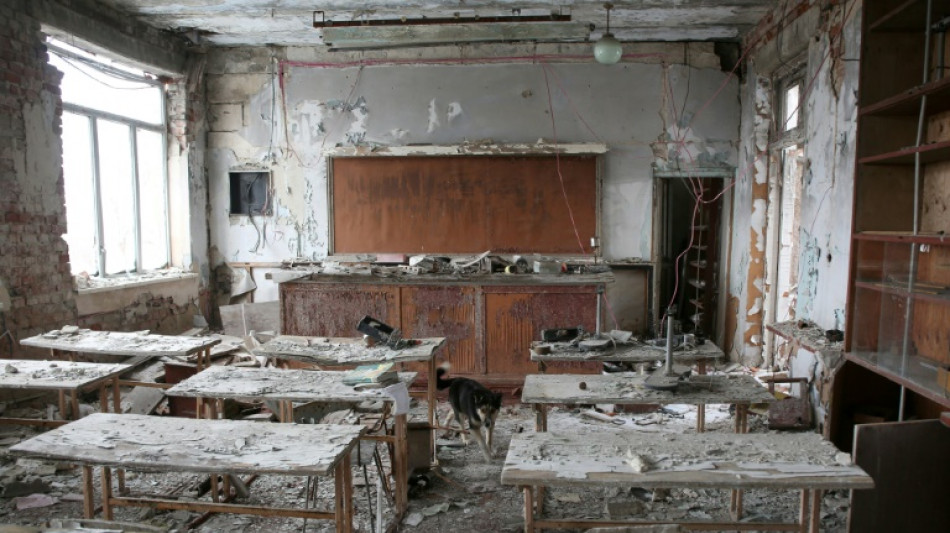

US rejects Russia demands on Ukraine but offers 'path' out of crisis
The United States on Wednesday rejected Russia's demand to bar Ukraine from NATO and said it believed Moscow was ready to invade but offered what it called a new "diplomatic path" out of the crisis.
One month after Russia put forward sweeping security proposals, having sent tens of thousands of troops to Ukraine's border, the United States delivered a reply in coordination with NATO allies and said it was ready for any eventuality.
Secretary of State Antony Blinken said he would speak again in the coming days to Russian Foreign Minister Sergei Lavrov, whom he met Friday in Geneva, amid a separate diplomatic initiative led by France.
"It sets out a serious diplomatic path forward should Russia choose it," Blinken told reporters of the US response, which he said would remain confidential.
He renewed an offer on "reciprocal" measures to address mutual security concerns including reductions of missiles in Europe and transparency on military drills and Western aid to Ukraine.
But he made clear that the United States would not budge on Russia's core demand that Ukraine never be allowed to join NATO, the US-backed military alliance.
"From our perspective. I can't be more clear -- NATO's door is open, remains open, and that is our commitment," Blinken said.
Russia, which has a complicated historical relationship with Ukraine, has fueled an insurgency in the former Soviet republic's east that has killed more than 13,000 people since 2014.
Russia that year also seized Crimea after the overthrow of a government in Kyiv that had pushed back on efforts to move closer to Europe.
The United States has warned of severe and swift consequences if Russia invades, including possible personal sanctions on President Vladimir Putin.
Blinken's deputy Wendy Sherman, who led a previous round of talks with Russia, said that Putin seemed ready to invade despite the US warnings.
"I have no idea whether he's made the ultimate decision, but we certainly see every indication that he is going to use military force sometime perhaps (between) now and the middle of February," Sherman told a forum.
She said Putin may be waiting so as not to overshadow the February 4 start of the Winter Olympics in Beijing, which the Russian leader will attend amid a diplomatic boycott by the United States and several of its allies.
- French-led talks -
In another bid to defuse tensions, the Kremlin's deputy chief of staff Dmitry Kozak and senior Ukrainian presidential advisor Andriy Yermak met in Paris alongside French and German diplomats.
"It's very encouraging that the Russians agreed to enter into this diplomatic format again," an aide to French President Emmanuel Macron said.
Yermak wrote on Twitter that the talks were "a strong signal of readiness for a peaceful settlement."
The French official said that diplomatic efforts were required at the same time as the West ramps up its threats to Moscow about the consequences of an invasion.
"We want a de-escalation, which means both dialogue and dissuasion," the aide said on condition of anonymity.
"The sanctions must not lead to retaliation that will boomerang on us and have a cost," the aide said. "Sanctions are not the be-all and end-all of the response."
US President Joe Biden, who spoke with European leaders by video-conference on Tuesday, said that any Russian military attack on Ukraine would trigger "enormous consequences" and could even "change the world."
Kremlin spokesman Dmitry Peskov warned against attempts to punish Putin personally.
"Politically, it's not painful, it's destructive," Peskov told reporters.
The Kremlin has previously said any US sanctions personally targeting Putin would be akin to crossing a red line, warning the move could result in a rupture of bilateral ties.
- Ukraine seeks way out -
The United States again encouraged its citizens to leave Ukraine, warning an invasion could be imminent.
But Ukrainian Foreign Minister Dmytro Kuleba said that the number of Russian troops deployed along the border was not enough for a major attack.
He told reporters that troops posed "a threat to Ukraine" but they were "insufficient for a full-scale offensive."
Eager to find a way out of the crisis, Ukraine's government has made the first move envisaged by the French by withdrawing a bill in parliament this week governing the status of Russian-backed separatist provinces in the east of the country, which Moscow saw as violating previous commitments.
France is hoping that Russia will agree to some "humanitarian measures" such as prisoner exchanges in eastern Ukraine and the opening of checkpoints manned by the separatists.
France is also pushing for "a public statement from the Russians about their intentions that reassures everyone," the Macron aide said.
burs-sct/ec
P.Mueller--MP




